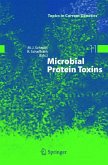Bacterial toxins were the first molecules identified as responsible for serious bacterial diseases in humans and animals. They are extremely diverse in terms of size, structure, receptor, enzymatic activity and specific mode of action. Recently, a major effort has been made to unravel the mechanisms of action of these molecules. These include extracellular activity, forming membrane pores, and intracellular activity, where many functional proteins are inhibited, such as G proteins, RAS proteins, translation elongation factor 2 and SNAREs proteins. Consequently, bacterial toxins are at the frontier of various disciplines, including bacteriology, cell biology, molecular biology, immunology and vaccinology. In this way, they are applied in a number of therapeutic and aesthetic fields, representing their positive side. This is what we call toxin therapy.
Bitte wählen Sie Ihr Anliegen aus.
Rechnungen
Retourenschein anfordern
Bestellstatus
Storno








